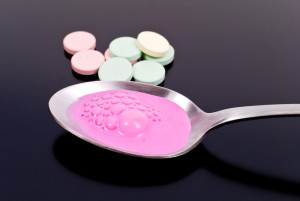Most of us love a big holiday dinner or a fun night out on the town. That is, unless you’re one of millions of Americans who suffer from heartburn, aka gastroesophageal reflux disease (GERD). It occurs when acidic contents of the stomach flow back up into the esophagus, irritating the lining of the esophagus, causing a burning sensation.
Simple changes in diet and lifestyle can help manage and control your heartburn. For example, things like avoiding caffeine, eliminating fatty or acidic foods, losing excess weight and quitting smoking. However, lifestyle changes offer only temporary relief. If you have daily symptoms or it occurs more than three times a week, medication is recommended for a short time. The problem is, with so many medications out there, which one do you take?
Antacids
These are the most popular and are over-the-counter, often recommended as initial treatment to help soothe minor heartburn. These include Tums, Maalox, Rolaids and Mylanta, which neutralize stomach acid to provide fast, short-term relief in mild cases of acid reflux. Some antacids come in liquid form to coat the lining of the esophagus and help reduce the amount of acid in the stomach. They won’t help reduce inflammation of the esophagus associated with GERD. Antacids are better for immediate relief after a big meal.
Oral suspension medicines
Medications like Pepto Bismol are sometimes used to treat heartburn and indigestion as well as nausea, diarrhea and ulcers in the throat, stomach and intestines. It’s short-lived in its effectiveness because once the coating wears off, it doesn’t do much.
Anti-gas, anti-flatulence
Some people experience pressure and bloating when they get heartburn. OTC products like Gas-X and Beano help relieve pressure, bloating, and gas in the digestive tract. It works by breaking up gas bubbles.
H-2-receptor blockers
Previously, available only with a prescription, H-2-receptor blockers like Pepcid AC and Zantac are now OTC. It’s effective for mild reflux and works by reducing the acid your stomach makes. While they don’t work immediately, they’re effective longer than antacids.
Proton Pump Inhibitors (PPIs)
The most powerful drugs for greatly reducing your body’s production of stomach acid and helping heal damaged esophageal tissue. These include Prilosec, Prevacid and Nexium and are usually taken under the care of a physician. They work well for heartburn when antacids or H2 blockers don’t. It’s taken by people if you have more frequent, severe symptoms. However, studies show that long-term use of the PPIs could cause cancer, so only use for a short time.
It’s important for patients to pay attention to the frequency and severity of their symptoms. Frequent episodes of heartburn may be signs of a more serious problem. See your doctor if you have GERD, because it causes severe problems if left untreated.
If you’re experiencing heartburn or acid reflux on a regular basis, contact Houston Heartburn.

